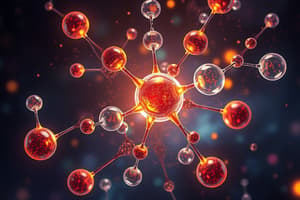Podcast
Questions and Answers
Milyen organogén elemek azonosíthatóak az élő szervezetekben található szerves vegyületekben?
Milyen organogén elemek azonosíthatóak az élő szervezetekben található szerves vegyületekben?
Melyik tudományág ered alkimistákból és a bölcs kő és az élet elixírjének kutatásából?
Melyik tudományág ered alkimistákból és a bölcs kő és az élet elixírjének kutatásából?
- Fizika
- Kémia (correct)
- Biológia
Hogyan járult hozzá Wöhler az organikus vegyületek kutatásához?
Hogyan járult hozzá Wöhler az organikus vegyületek kutatásához?
Hogyan lehetnek azonos molekuláris képlettel rendelkező vegyületek kémiai szerkezetükben különbözőek?
Hogyan lehetnek azonos molekuláris képlettel rendelkező vegyületek kémiai szerkezetükben különbözőek?
Melyik elméletet cáfolta meg Wöhler az oxálsav szintézisével?
Melyik elméletet cáfolta meg Wöhler az oxálsav szintézisével?
Flashcards are hidden until you start studying
Study Notes
- Organic chemistry originated from alchemy and the search for the philosopher's stone and the elixir of life.
- Lavoisier distinguished organic compounds from inorganic ones by identifying the presence of organogenic elements (C, N, O, H) in living organisms.
- Wöhler's synthesis of oxalic acid from inorganic materials disproved the theory of vitalism.
- There are approximately 4 million known organic compounds, mostly composed of organogenic elements.
- Carbon atoms can form up to four strong covalent bonds and can bond with each other to create chains and rings.
- Different bonding arrangements of carbon atoms can result in isomers, which have the same molecular formula but different structures.
- Heteroatoms (O, N, P, S, halogens) can also participate in molecular formation with carbon and hydrogen in organic compounds.
- Many drugs and dyes are synthesized from natural compounds.
- Organic compounds are more susceptible to decomposition during experiments than inorganic ones.
- Organic chemistry has practical applications in various fields, including medicine and materials science.
Studying That Suits You
Use AI to generate personalized quizzes and flashcards to suit your learning preferences.




